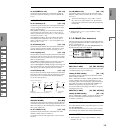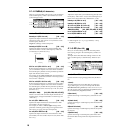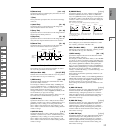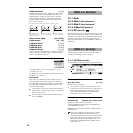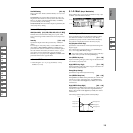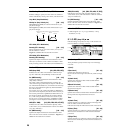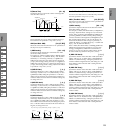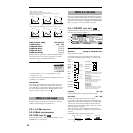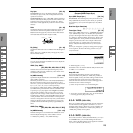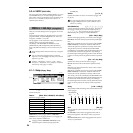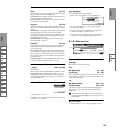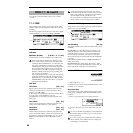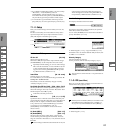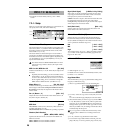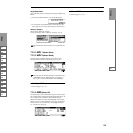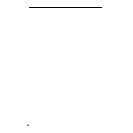
PROG
1.1
2.12.23.14.14.25.15.25.36.17.17.2
PROG
1.1
2.12.23.14.14.25.15.25.36.17.17.2
23
Key Sync. [Off, On]
On (checked): Key Sync. will be On. The LFO will start
each time you play a note, and an independent LFO will
operate for each note.
Off (unchecked): Key Sync. will be Off, and the LFO effect
that was started by the first-played note will continue to be
applied to each newly-played note. (In this case, “Delay”
and “Fade” will be applied only to the LFO when it is first
started.)
Fade [00…99]
Specifies the time from when the LFO begins to apply until
it reaches the maximum amplitude. When “Key Sync.” is
Off, the fade will apply only when the LFO is first started.
How “Fade” affects the LFO (when “Key Sync.” is On)
Dly (Delay) [00…99]
Specifies the time from note-on until the LFO effect begins to
apply.
When “Key Sync.” is Off, the delay will apply only when
the LFO is first started.
5.3–1b: Freq.Mod (Frequency Modulation)
You can use two alternate modulation sources to adjust the
speed of the OSC1 LFO1.
AMS1 (Freq. AMS1)
[Off, (PEG, FEG, AEG, LFO2, KT, EXT)]
Indicates the source that will adjust the frequency of the
oscillator 1 LFO1 (
☞p.212 “AMS List”). OSC1 LFO1 can be
modulated by OSC1 LFO2.
Int (AMS1 Intensity) [–99…+99]
Specifies the depth and direction of the effect that “AMS1
(Freq. AMS1)” will have.
When this parameter is set to a value of 16, 33, 49, 66, 82, or
99, the LFO frequency being can be increased by a maxi-
mum of 2, 4, 8, 16, 32, or 64 times respectively (or decreased
by 1/2, 1/4, 1/8, 1/16, 1/32, or 1/64 respectively).
For example, if “AMS1 (Freq. AMS1)” is Note No., positive
(+) values of this parameter will cause the oscillator 1 LFO
to speed up as you play higher notes. Negative (–) values
will cause the oscillator 1 LFO to slow down as you play
higher notes. This change will be centered on the C4 note.
If “AMS1 (Freq. AMS1)” is set to JS +Y #01, raising the value
of this parameter will cause the oscillator 1 LFO1 speed to
increase as the joystick is moved away from yourself. With a
setting of +99, moving the joystick all the way away from
yourself will increase the LFO speed by approximately 64
times.
AMS2 (Freq. AMS2)
[Off, (PEG, FEG, AEG, LFO2, KT, EXT)]
Int (AMS2 Intensity) [–99…+99]
Indicates settings for a second alternate modulation source
that will adjust the frequency of the oscillator 1 LFO1.
☞“AMS1 (Freq. AMS1),” “Int. (AMS1 Intensity)”
5.3–1c: MIDI/Tempo Sync.
(Frequency MIDI/Tempo Sync.)
Sync. (MIDI/Tempo Sync.) [Off, On]
On (checked): The LFO frequency will synchronize to the
tempo (MIDI Clock). In this case, the values you specified
for “Frequency” (5.3–1a) and “Freq.Mod” (5.3–1b) will be
ignored.
Base Note (Sync. Base Note)
[ , , , , , , , ]
Times (Sync. Times) [01...16]
When “Sync. (MIDI/Tempo Sync.).” is checked, these When
“Sync. (MIDI/Tempo Sync.)” is checked, these parameters
specify a note length “Base Note (Sync. Base Note)” relative
to “ (Tempo)” and the multiple “Times (Sync. Times)” that
will be applied to it. These parameters will determine the
frequency of the OSC1 LFO1. For example if “Base Note
(Sync. Base Note)” is (quarter note) and “Times (Sync.
Times)” is 04, the LFO will perform one cycle every four
beats.
Even if you change the “ (Tempo)” setting of the arpeggia-
tor or sequencer, the LFO will always perform one cycle
every four beats.
■ 5.3–1d: UTILITY
☞“Write Program” (1.1–1c)
For details on how to select the desired utility function, refer
to “PROG 1.1–1c: UTILITY.”
Swap LFO 1&2
This exchanges the settings of LFO 1 and 2. If LFO2 is
selected in AMS1 (Freq. AMS1) or AMS2 (Freq. AMS2) of
LFO1 Freq.Mod (5.3–1b), then these settings will be invalid
for LFO2 after LFO1 and 2 have been exchanged. If you
select this from the OSC1 LFO1 or OSC1 LFO2 page, LFO1
and LFO2 of OSC1 will be exchanged.
1 Select “Swap LFO 1&2” to access the dialog box.
2 To execute, press the [F8] (“OK”) key. To cancel without
executing, press the [F7] (“Cancel”) key.
5.3–2: 1LFO2 (OSC1 LFO2)
Here you can make settings for the OSC1 LFO2, which is the
second LFO that can be applied to oscillator 1. (
☞“5.3–1:
OS1LFO1 (OSC1 LFO1)”) However, it is not possible to use
the LFO to apply modulation in “AMS1 (Freq. AMS1)” or
“AMS2 (Freq. AMS2)” of Freq. Mod.
5.3–3: 2LFO1 (OSC2 LFO1)
This can be used when “Mode (Oscillator Mode)” (2.1–1a) is
set to Double. Here you can make settings for the OSC2
LFO1, which is the first LFO that can be applied to oscillator
2 (
☞“5.3–1: OS1LFO1 (OSC1 LFO1)”).
Note-on Note-off
“Fade”
“Delay”



